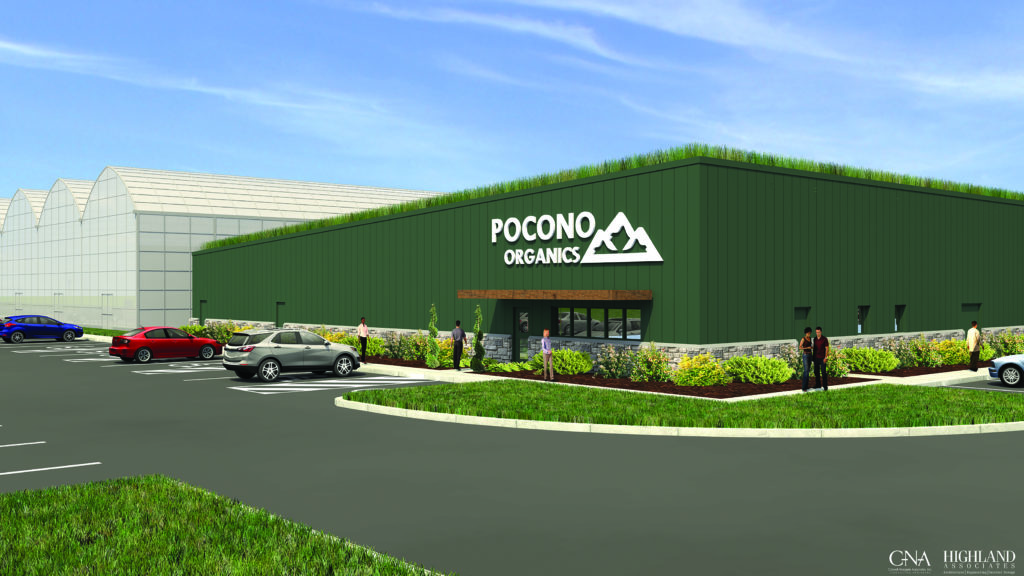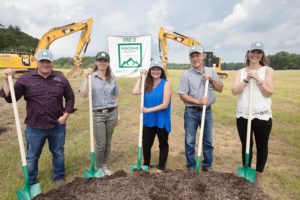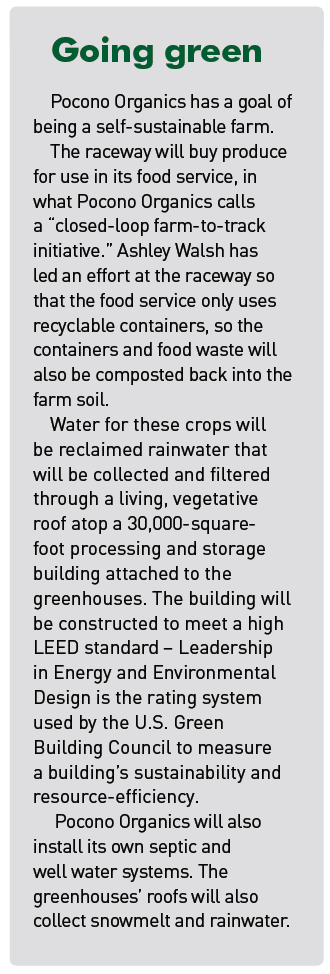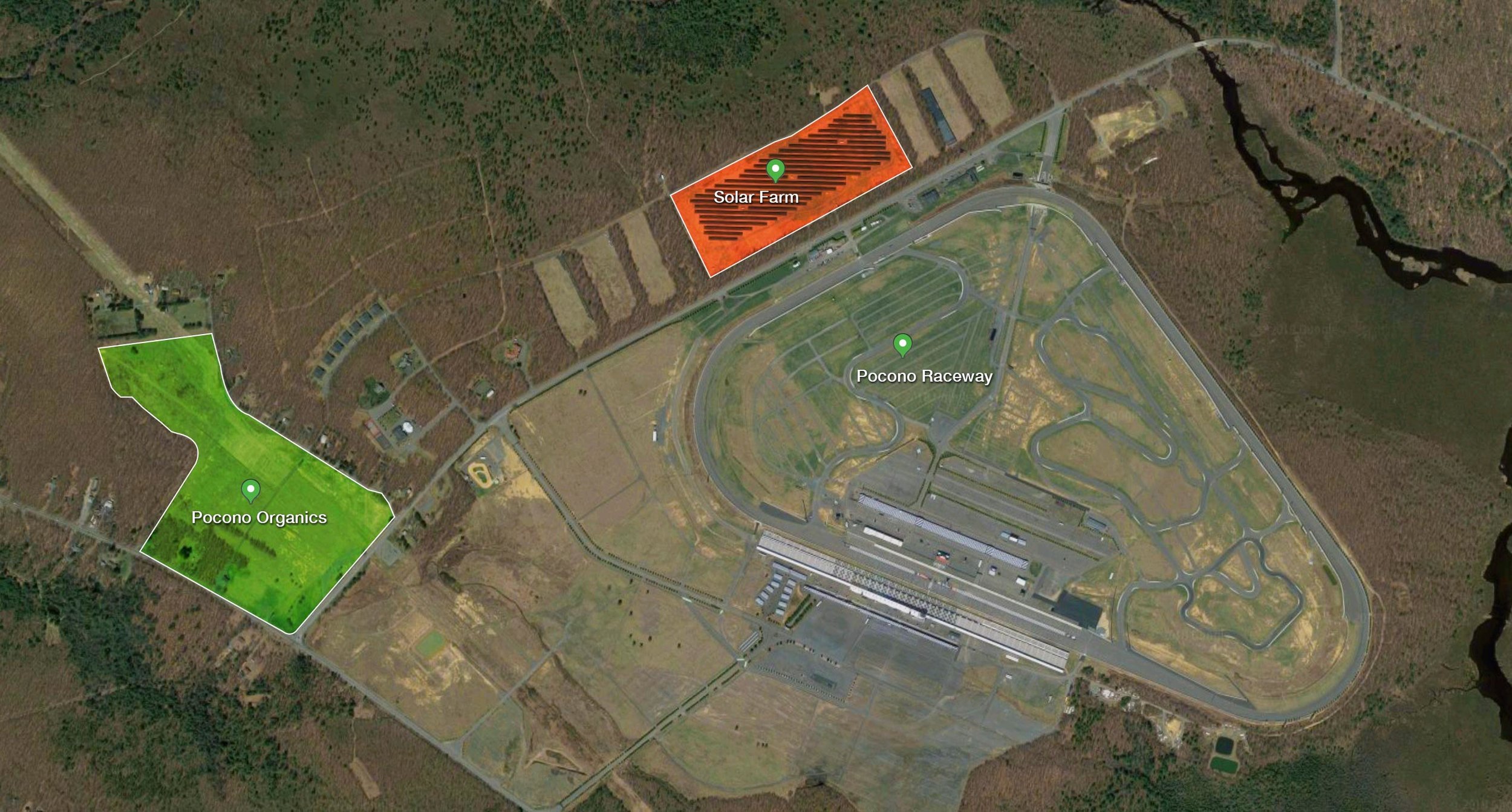
Dec 11, 2018Pocono Organics market to target NASCAR fans, ski tourists
Many a farm owner has sought to turn a local produce market into an agritourism destination. A rarer story is the entrepreneur who already owns a major tourism destination and is now seeking to add to it an organic farm and large produce market.
Ashley Walsh is a third-generation owner of Pocono Raceway, one of a very few NASCAR tracks that are independently owned – most NASCAR tracks are owned either by Speedway Motorsports or the International Speedway Corp. Her grandfather, Joe Mattioli, founded the raceway.

Photos: Pocono Organics
But the Mattioli family office took a different turn in July, breaking ground on a 50-acre organic farm, nearly 40,000 square feet of greenhouses, a processing facility and market adjacent to the racetrack at Long Pond, Pennsylvania. The operation, called Pocono Organics, will grow a mix of vegetables, fruit, herbs, grains and flowers.
For farming know-how, the family turned to the Rodale Institute, a Kutztown-based nonprofit dedicated to pioneering organic farming through research and outreach.
“I knew about them – they’re just an hour away from us in Pennsylvania,” Walsh said. “So, I called them, and we had a meeting,” she said. “They were like, why is a NASCAR racetrack calling an organic research station?”
Why organic
The reason was a very personal one to Walsh.
“I had been diagnosed with gastroparesis 10 years ago, which is a paralyzed stomach,” she said. “I can’t digest food properly. I have to eat like a baby and puree, and (make) juice, and make soups out of everything. I can’t have any meat or fruits or vegetables in there in their raw form.”
While seeking treatment and adjusting her diet, Walsh turned to organic foods and found an undeniable improvement in her quality of life.
“I’ll never be cured or anything like that, but I went from having five days a week of being sick to being sick five days a month,” she said. “I just had a baby – a nine-pound, three-ounce baby – which I would never have thought possible.”
Walsh wanted to share organic foods with others. She came up with the idea of an organic farm and market after walking her dog on property near the racetrack. The property was unused at that time, although the Pocono Raceway had purchased it in the 1950s for parking. Before that, in the 1940s, it had been a spinach farm.
Walsh spent three years quietly working with the Rodale Institute to develop a detailed plan for her project. When Pocono Organics and the Rodale Institute rolled out the plan in July, they used the phrase “back to our roots.” The spinach farm turned raceway lot would be a farm once again.

Planning production
As a business, the organic farmers’ market will draw customers from the racetrack and elsewhere in the region. There is a hotel and event center located between the racetrack and the future site of Pocono Organics. Pennsylvania’s Pocono Mountains also have six ski resorts and draw a sizeable number of ski tourists each year.
The farm stand will offer fresh fruit, vegetables and flowers in addition to smoothies and other pre-made items. The property will include an event space to engage the local community with special events, and host annual festivals.
“I think there’s a lot of different opportunities there for agritourism,” Walsh said.
The Rodale Institute will manage the venture’s farm operation. Rodale Institute Executive Director Jeff Moyer called the partnership revolutionary.
“Not only are we showcasing the ability to grow food in a way that is profitable for farmers, healthy for communities and positive for the environment, we’re doing it in a setting that will welcome the public and consumers to be part of the experience,” he said at the groundbreaking.

Digging in
Jonathan Skaro, an agribusiness graduate of Delaware Valley University, was recently hired as the farm manager.
His first task will be establishing open-field growing on the 50-acre site. He sees some of his initial field crops as pumpkins, squash, zucchini, watermelons, tomatoes and sweet corn – yellow, white and bi-color, that could be used in a public festival. Pocono Organics will sell crops directly to the raceway food service, so Walsh expects tomatoes, lettuce and potatoes will be a big part of what it grows.
“We’re going to do a bit of everything,” she said. There are already some old apple trees on the property. “We want to do some specialty items.”
Skaro would like to establish additional fruit crops, including blueberries or even apples.
“I’d really like to do some organic strawberries here,” Skaro said. “We have the soil for it.”
The greenhouses planned for the site will add new possibilities to what they can grow. The greenhouses will be 35 feet high with twin peaks, a heater and a trough in between the peaks to reclaim snowmelt water, Walsh said. Featuring polycarbonate panels imported from Israel, the greenhouses are designed to have excellent light diffusion and shadows under the cover, Skaro said.
Skaro said the vertical space will likely be used for growing trellis tomatoes, but he said they’re still experimenting with what could be indoors. There will be enough space, hypothetically, for growing tree fruit under the polycarbonate.
Alongside his crop planning, he’s outlining his plans for warfare against pests and weeds. Crop rotation can discourage pest establishment, and pests can be concentrated by planting their favorite crops in a particular area – an example of this would be planting eggplant to pull aphids from tomatoes. Plant flowers such as sunflowers draw pollinators, some of which are dominant over aphids.
Beneficial insects, such as aphid-eating ladybugs and parasitic wasps, can be released. Weeds can be sprayed from stem to roots with a mixture of soap, high vinegar and water.
In outdoor growing, plasticulture is a great resource for preventing weeds underneath the plants, and intercultivators can be used to destroy weeds between the rows of plastic. Skaro said plasticulture can be used for many different crops.
“Every farmer has their own little tricks,” he said.
– Stephen Kloosterman, FGN Associate Editor
Top photo: The organic farmers’ market will draw visitors from the racetrack and others in the region.

















